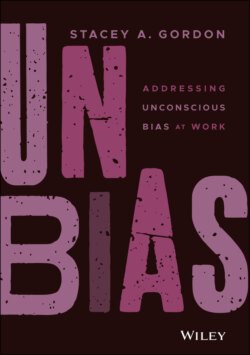Читать книгу UNBIAS - Stacey A. Gordon - Страница 6
Introduction
ОглавлениеDiversity, inclusion, bias – these can be sensitive topics that are difficult to talk about, especially at work. We are at a time when we don't know how to talk about sensitive topics. We've been taught to avoid them and now they are staring us in the face. I am writing this book in an election year when opinions about everything, including politics, have become extremely divided. Individuals are at opposing ends of the spectrum with no tools for how to listen to the point of view of another without name calling and labeling. We have been taught for so long not to discuss sex, politics, or religion, when what we should have been taught was how to constructively discuss sex, politics, and religion. And what is noticeably missing from what I call the three taboo terms is race. It is so ingrained in us not to discuss race that we don't even talk about the fact that we don't talk about race. It is no surprise then, that it is difficult for us to have conversations around race, gender, privilege, and other dimensions of diversity in the workplace.
It is also not surprising there is a reluctance and a lack of understanding around why we're having these conversations at work at all. I hear that work isn't the place for these conversations. We just come to work and do our jobs and that is what we should focus on.
These are excuses, and I will tackle those and many more throughout the book, but what I want to address is the chasm that is growing between individuals of different races. Why does it always have to be about race? Your perception may be that it is always about race, but it isn't. Unconscious bias at work, in your workplace, is about race, gender, sexual orientation, age, ability, religion, veteran status, socioeconomic background, education, culture, and geography.
We do keep coming back to race because we haven't addressed the issues of race and racism in the United States. The only way to get past race is to go through it. Winston Churchill said, “If you're going through hell, keep going,” and we haven't kept going. We keep stopping because the road is tough, the conversations are uncomfortable, and the realization that what we've been doing for many years may have been wrong is difficult to face.
Fortunately for you, I have no qualms about diving in headfirst and tackling the tough topics we need to address, and I'll do it by helping you to address unconscious bias at work.
